Tokyo 2021: Tassie’s Olympic hopefuls
Tasmanian Olympic aspirants share their stories of preparation for the Tokyo Games, in the wake of a year that threatened to overthrow the entire event. CONTENDERS >>
Lifestyle
Don't miss out on the headlines from Lifestyle. Followed categories will be added to My News.
The postponement of the Tokyo Olympics because of Covid-19 last year was a blow to a lot of athletes who had been training in earnest for the 2020 Games, only to learn there was no competition to go to any more.
But having the additional year to prepare for the rescheduled 2021 Tokyo Olympics in July turned out to be a silver lining for a lot of contenders, as well.
It meant more time to hone skills and build strength and, for some, a chance to heal injuries that would have taken them out of contention for last year, anyway.
This week, some Tasmanian Olympic aspirants share their stories of preparation for the Tokyo Games, in the wake of a year that threatened to overthrow the entire event.
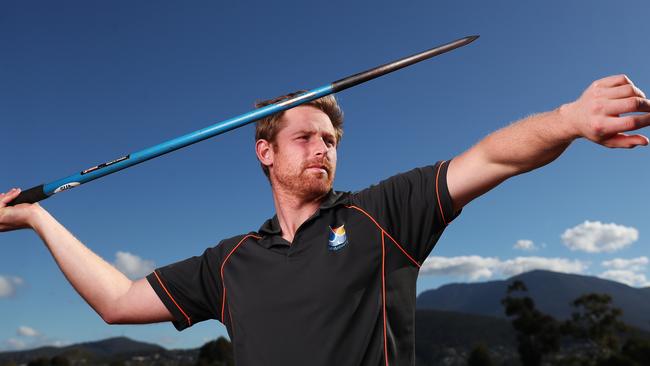
Hamish Peacock
Hobart javelin-thrower Hamish Peacock, 30, was probably more grateful than most other athletes when the 2020 Tokyo Olympics were postponed for a year.
In March last year, the dual Commonwealth Games medallist and Rio Olympian fell while competing at an event in Sydney and suffered a catastrophic shoulder injury.
“It was a bad one, I tore my pectoral muscle off the bone,” he says. “It was major surgery to reattach it, so there was no way I was going to be able to go to Tokyo last year.”
Having that extra year to recover and regain his form was a lucky windfall for Peacock, who made good use of the second chance he was given to qualify for Tokyo this year.
While he remains a contender for the Olympic team, he has yet to qualify, with qualification not being final until late June. So he still has some work to do and a couple more events to compete in before he will know if he has made the cut.

“It’s taken me quite a while to get back to full strength – another six months would have been nice!
“It’s only been in maybe the last six weeks or so that I’ve really started to get back up to my previous strength and started throwing with any consistency again.
“It’s been really hard, some days I could throw 65-70m with no difficulty and everything felt good. Then the next day my shoulder would lock up and I could barely throw 50m. But I’m much more consistent now.”
Peacock – who is coached by his father Evan Peacock and works as a civil engineer in Hobart – says he is mostly just happy to be back training again and while he is hopeful of a place in the Olympic team, he is putting no pressure on himself
“I haven’t made that jump back up to throwing 80m again yet, but I’m close. I’ll be in Queensland to compete in a couple of comps in June, so we’ll see how it goes.”
Peacock has previously won bronze at the Glasgow Commonwealth Games and Silver at the Gold Coast Commonwealth Games, but has yet to medal at an Olympic Games.
Still deferring to his shoulder injury, he is wary about setting his expectations too high for Tokyo but hopes to be a finals contender at the very least.
“Javelin can be pretty unpredictable, the difference between a good day and an average day can be quite big.
“If you can throw 84m you will be in top six, but everyone who qualifies at an Olympic level has thrown 84m at some point before, you just have to be able to do it on the day.”
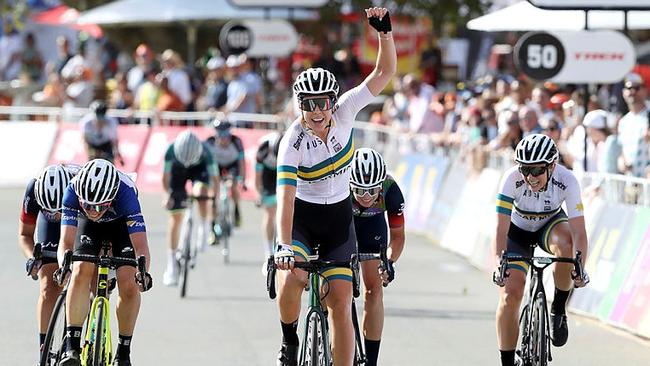
Georgia Baker
Cyclist Georgia Baker has already been confirmed for the Olympic cycling squad and says it is a relief just to know everything is going ahead.
“A few months ago it was still pretty touch-and-go as to whether we would be going at all,” she says.
Originally from Perth just south of Launceston, 26-year-old Baker is now based in Adelaide at the Australian Institute of Sport’s cycling training centre.
She has an impressive record across numerous national and world championship events and has competed at the Gold Coast Commonwealth Games and the Rio Olympics.
The Rio squad’s medal chances were dashed following a pre-Olympics crash, but they still finished fifth in the Team Pursuit.
Nonetheless, Baker is seeing Tokyo as her chance to settle that particular score, returning to the Olympics with a vengeance.
“Oh yeah, definitely, and I learnt a lot from Rio, it was my first Olympics, and I want to take those learnings to Tokyo.
“A lot has changed in that last five years, both in terms of my personally and how I ride. I’m a different person and a very different rider now, so bring it on.”
A big change to this year’s four-rider squad is the absence of Baker’s friend and fellow Tasmanian Amy Cure, who was due to compete at the Olympics last year but has retired since its postponement.
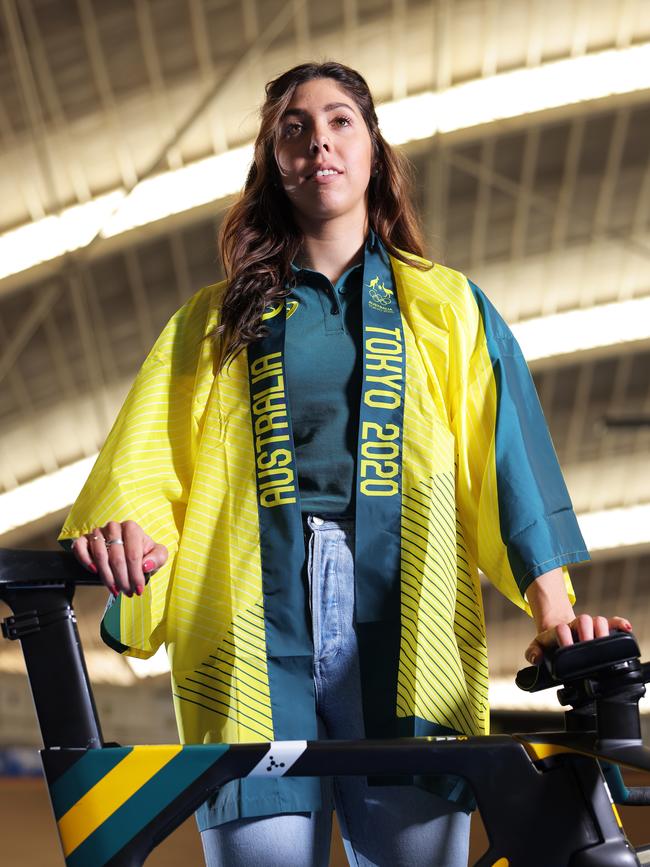
“It is a bit weird not having her around,” Baker says. “It’s been a year since she retired and we still catch up with her regularly. we are very close as a team, Amy always knows what we’re doing and is very supportive so she’s still with us in that sense.
“And that spot has been filled by Alex Manly now, she’s a vital part to the team and I think we’ve got a really strong team this year.”
Baker says having the Games postponed for a year was a frustrating blow for the team but she was determined to keep striving to compete in 2021.
“It was hard for Amy because that happened towards the end of her career but it wasn’t like that for me, I’m still driven and hungry so didn’t make much difference to me.
“Yes, it was disappointing but it was also another year to spend getting better, faster, stronger.”
Her training regimen is punishing right now, as the Games draw near. The team is spending long hours every day road-riding and in the gym building strength, and they are about to relocate to Brisbane to start intensive track training.
And through all the daily grind and slog of training, she says the excitement of competing in Tokyo keeps her motivated, although Covid-19 restrictions will make this a very different Games to Rio.
“The really exciting part is having all those people cheering you on, that atmosphere,” she says. “We won’t have that in Tokyo, which is a bit sad.
“But, at the same time, we train day-in, day-out with no crowd cheering us on at the Adelaide velodrome, so I’m sure we will manage just fine without one in Tokyo.
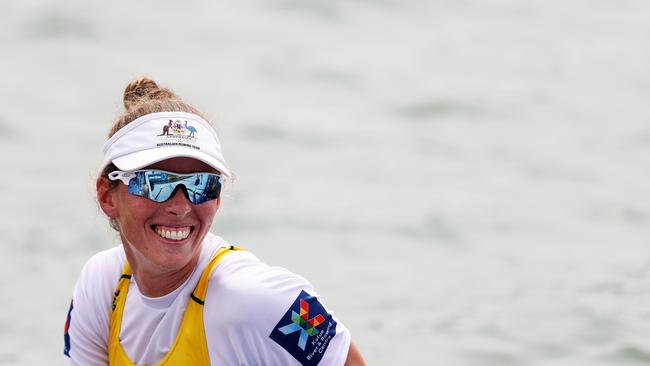
Sarah Hawe
Still in contention for Olympic selection, rower Sarah Hawe has just one more qualifying regatta to compete in before the Tokyo Games squad is announced on June 13.
And that is a competition in Adelaide that concludes on June 12.
“Yeah, it’s cutting it pretty fine,” the Tasmanian rower says.
“I’m feeling pretty good about it, though. We’ve been training as a squad in set boats for a while now and the crews haven’t changed much, which is a good sign.”
Hawe is training for the coxed eights team, which she says is a little different from the fours she is used to, but she is enjoying the change.
“In the last three international seasons I competed in, I’ve rowed in the women’s four, so it’s a different boat, four extra rowers, plus the coxswain.
“It’s a different feel, a different kind of race, it’s much faster, more sprint than endurance, so you can’t afford even the smallest mistakes.”
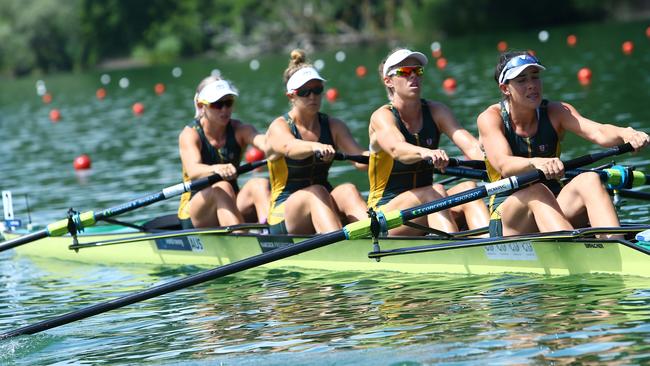
Originally from Hobart, 33-year-old Hawe used to row for the Huon Rowing Club at Franklin, before moving to the Rowing Australia Women’s National Training Centre in Penrith, NSW.
A veteran of numerous national and international championship events, Hawe is yet to compete in an Olympic Games.
And, rather like Hamish Peacock, Hawe feels oddly thankful for the postponement of the Tokyo Games last year, even though she was on track for selection in early 2020.
“Around March last year I’d been through all the selection trials but by that stage I had a shoulder injury that was causing me a lot of grief.
“So while it was frustrating when the games were postponed, it actually gave me the perfect opportunity to have the surgery I needed and deal with it properly, and get back into shape ready for 2021.”
The downside, though, has been trying to maintain that high-level training momentum for an extra year.
“It has been challenging keeping that motivation going for another year, especially when last year I thought it might be my last chance to go to an Olympic Games.
“So it’s been extra tiring for a lot of us because of all the extra training leading up to this year.”
Qualifying for the 2021 Games was a little bit tricky, though, since Rowing Australia made the decision not to send its rowers to the usual roster of European regattas since the Covid-19 pandemic.
“So instead of sending us overseas, they’ve been trying to simulate the experience with our own series of regattas around Australia. I feel like I’m in a different place every fortnight.
“It’s been a matter of creating racing opportunities locally and within our own teams to create competitive races.”
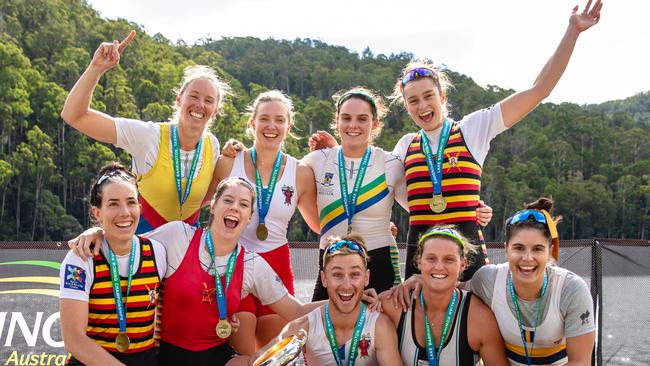
Hawe is unsure whether she will try for the next Olympics in 2024. Even though it is only a three-year break instead of the usual four, she is considering reducing her training load next year and taking a break of sorts. But she has not made her mind up yet.
If she is confirmed for the Tokyo rowing team on June 13, Hawe feels that she is as prepared as she could possibly be, physically, mentally and Covid-wise.
“At all of the regattas we’ve been to around the country, we’ve been treating it like an overseas event, going directly from the hotel to the regatta and straight back again, wearing our masks while we’re outside,” she says.
“We’re getting into those routines early so we’re used to it if we go to Tokyo.”
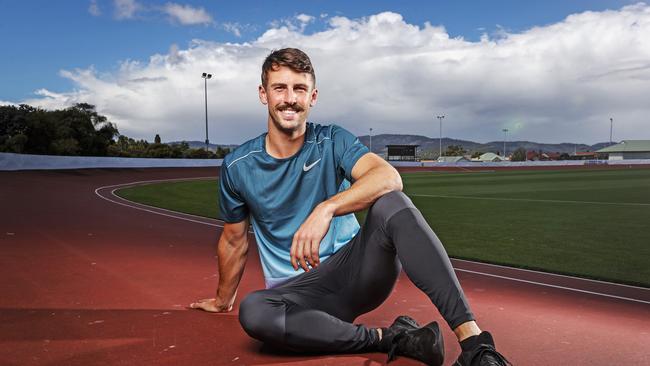
Jacob Despard
Hobart-born sprinter Jacob Despard is preparing for his last tilt at qualifying for the Australian 4x100m relay team, with a meet on the Gold Coast.
Based in Melbourne since 2017, Despard says it has been his lifelong dream to run in the Olympics but qualifying for the relay is a tough ask.
“We will race as a relay team twice in 4x100m to try and qualify for Tokyo but they only take the top 16 in the world these days,” he says.
“Last time we checked we were 21st and that was from a time we ran in 2019, because we obviously didn’t get many chances to run last yer.
“I think Australia’s relay teams generally rank quite high in the world, we’re a very competitive country. So that fact that we’re outside of that top 16 right now, I think, has a lot to do with us not being able to compete in the usual European events last year. Once we get the opportunity to run, I think we stand a good chance.”
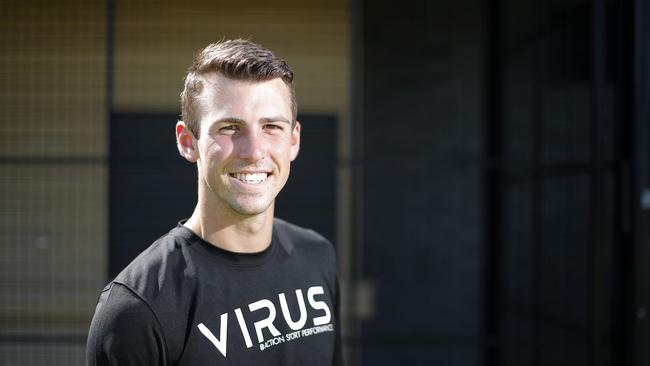
A former Stawell and Burnie Gift winner, Despard has never been to the Olympics and is hoping Tokyo will be his big chance.
He says having the extra year to prepare was helpful, even though living in locked-down Melbourne during the pandemic made it a little more difficult to get out and train last year.
“For me. it was a chance to rest and then train a bit harder and redefine where I was heading, it put me in a better position moving forward.
“If last year had gone ahead, I might not have made the time, but my vision is so clear right now, it made it easier for me to stick to my training and do the extra.”
Despard is also trying to qualify for the 100m but admits it will be tough to get through.
“Automatic qualification time for the 100m is 10.05 seconds, which is the toughest it’s ever been. So it’s probably a little unrealistic but it’s still a goal. Realistically, though, relay is my better chance.”
The relay camp on the Gold Coast runs from June 2-13, and with final qualifications being announced at the end of June, Despard says it will be a close call.
“We could do a great qualifying time on June 12, but someone in Europe could push us out with a better time on the 28th, so who knows.
“If we’re going to Tokyo, it will be last-minute notice, so I’m just preparing as if I’m going.”


